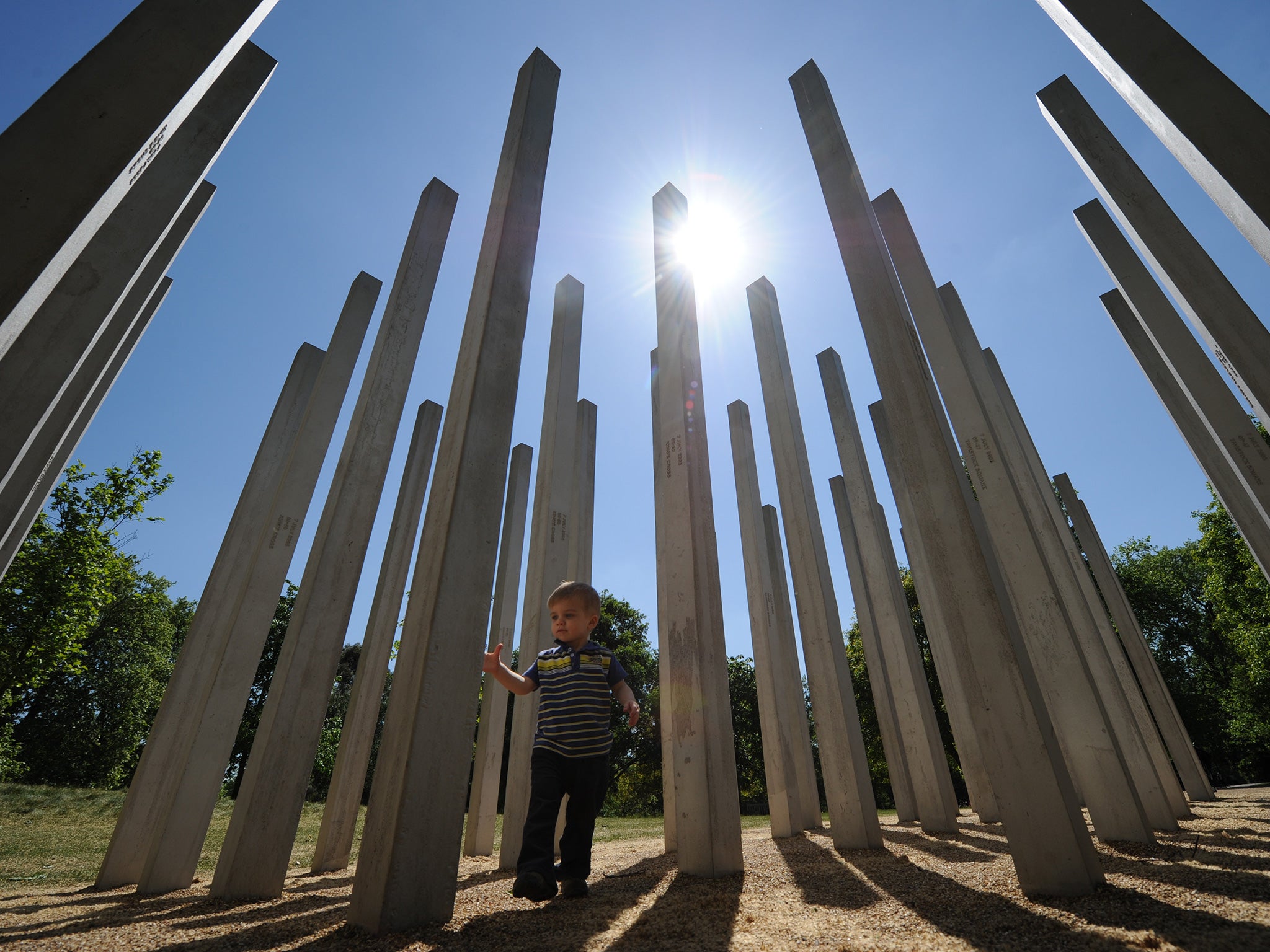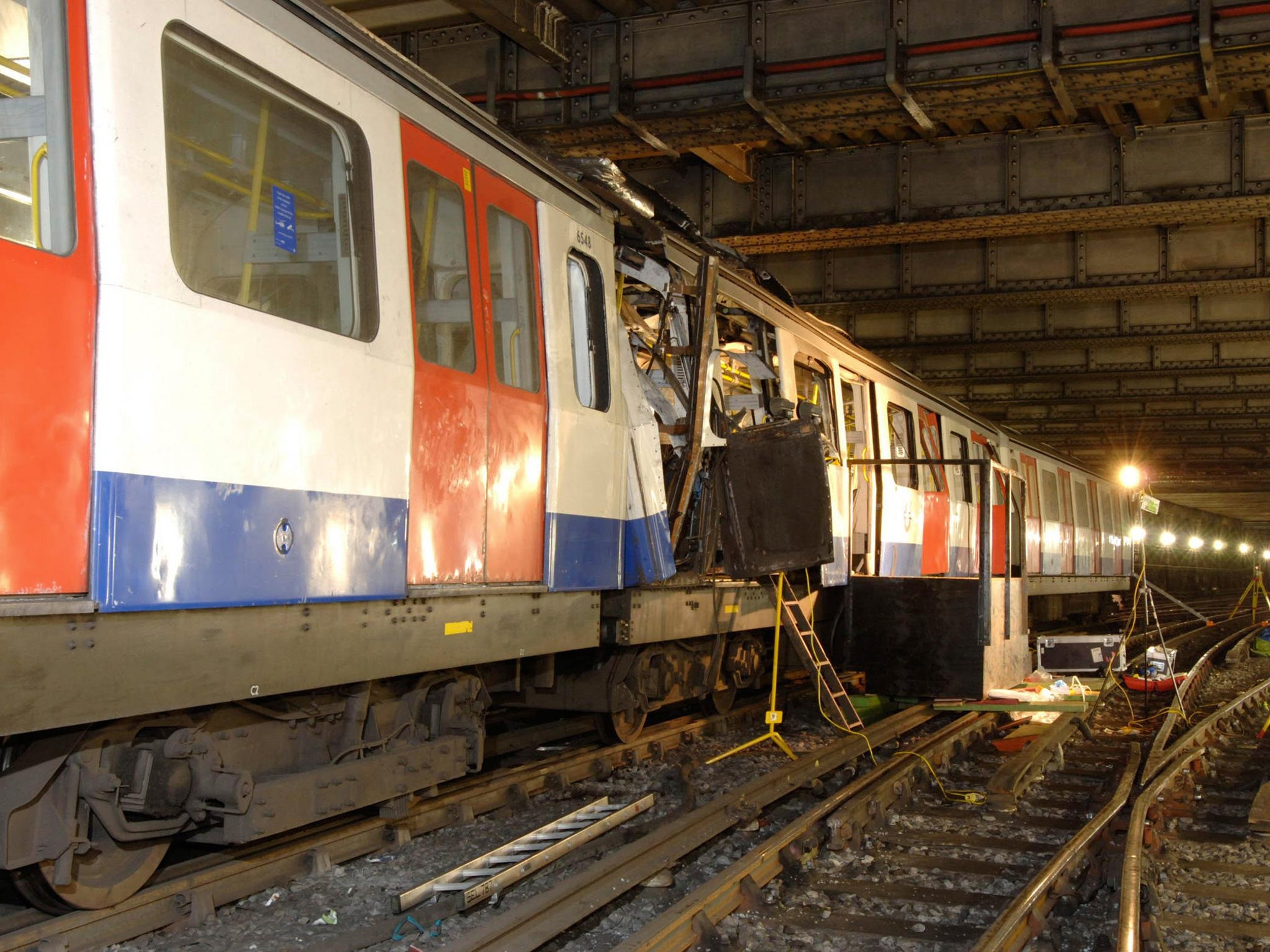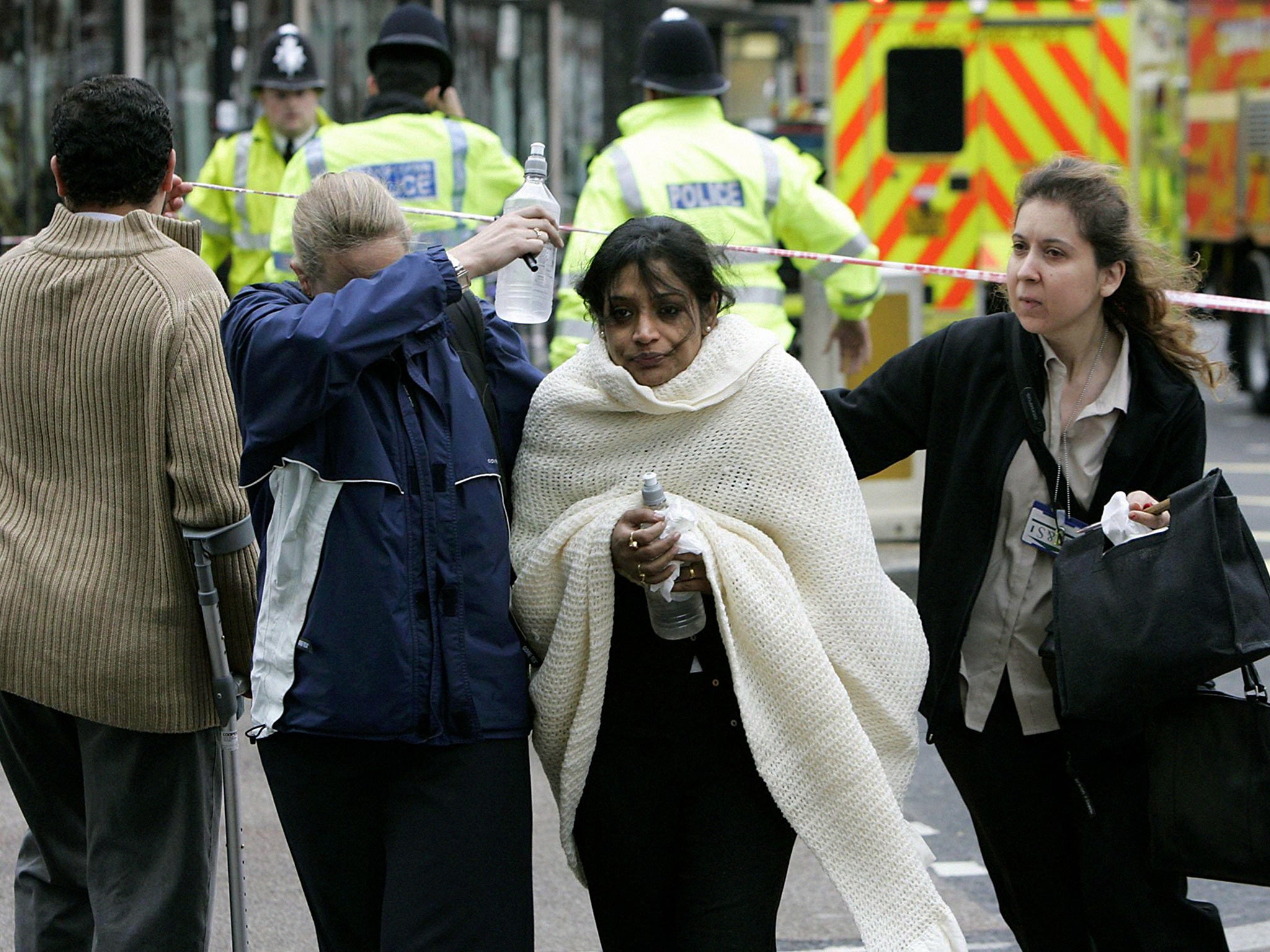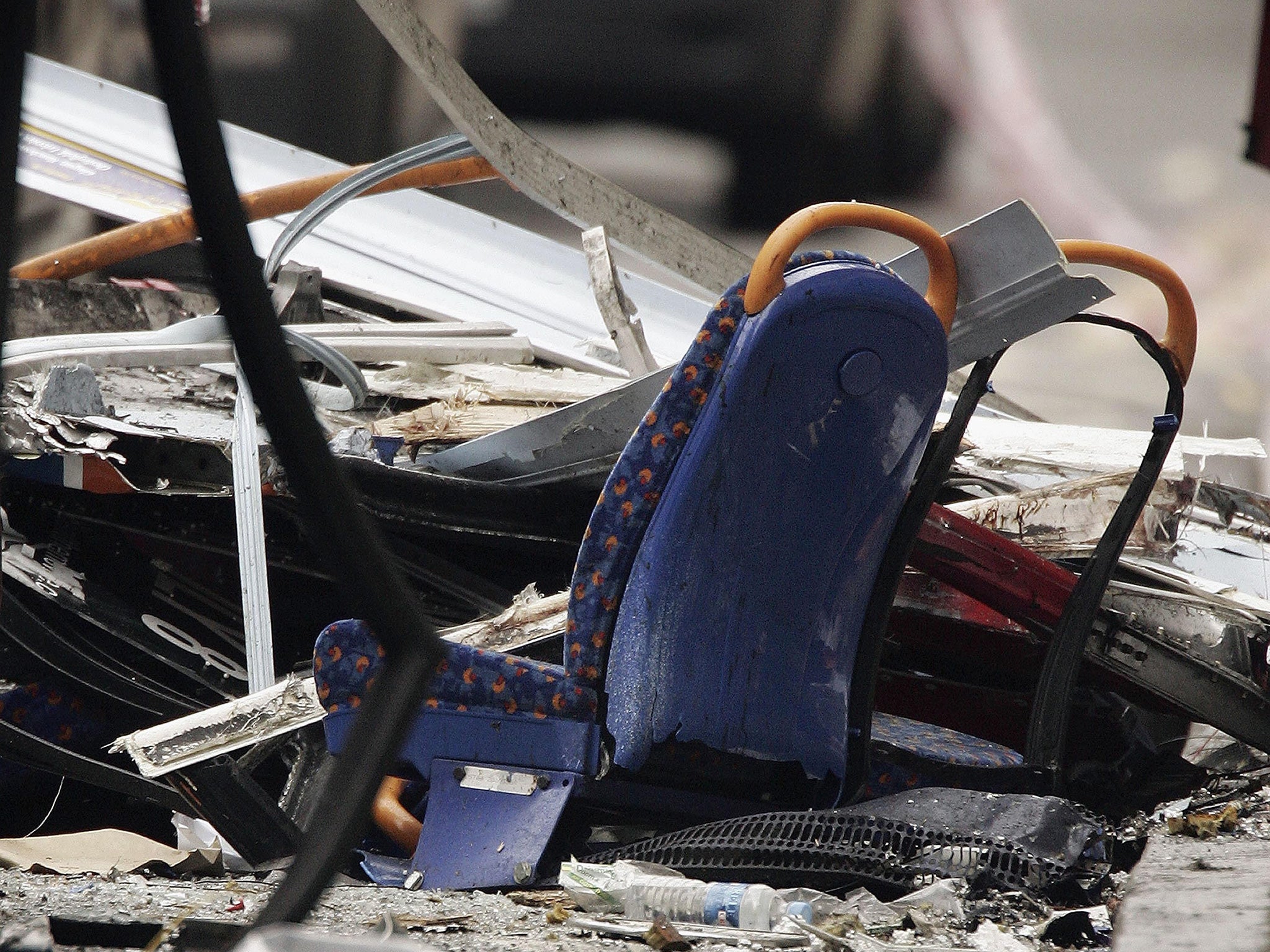7/7 bombings anniversary: Ten years after the terror attacks, is Britain an altered state?
The bombings killed 52 people and injured more than 700

Your support helps us to tell the story
From reproductive rights to climate change to Big Tech, The Independent is on the ground when the story is developing. Whether it's investigating the financials of Elon Musk's pro-Trump PAC or producing our latest documentary, 'The A Word', which shines a light on the American women fighting for reproductive rights, we know how important it is to parse out the facts from the messaging.
At such a critical moment in US history, we need reporters on the ground. Your donation allows us to keep sending journalists to speak to both sides of the story.
The Independent is trusted by Americans across the entire political spectrum. And unlike many other quality news outlets, we choose not to lock Americans out of our reporting and analysis with paywalls. We believe quality journalism should be available to everyone, paid for by those who can afford it.
Your support makes all the difference.When British youths detonated four bombs in London during the rush hour on Thursday 7 July 2005, they killed 52 and injured more than 700. They also exposed tensions in communities, and shortcomings in communications and security.
Here, five key figures of power or influence explain the consequences of the attack:
Mike Brown
MD, London Underground & Rail
The entire network was evacuated in less than two hours, yet early on the day itself Mr Brown made a decision that he would have to attempt to run the network the next morning.
“Obviously not the parts where the track had been severed,” he said. “But as far as possible, around 85 per cent of the network, I wanted to get running again. Not many people did travel [on 8 July] but it was really important to me, and important both for our staff and for London, that our response was getting things back operational as quickly as possible.”
Certain radio communication “black spots” existed at the time, but that has changed. “We were already in the process of introducing a new digital airway system, Connect, across our entire network. It’s totally different in its reliability, coverage and effectiveness, just much better. We also worked with the Home Office and the emergency services to ensure that their radios, by deploying something called Airwave, work on our estate. So there is no issue now with emergency services talking to each other in what can be quite challenging circumstances.”

Connect was in full use by 2008. The two systems give every Tube staff member a personal radio and the ability to contact any other. They also allow the broadcast of centralised messages from control rooms to any number of staff across the network. Today there are no gaps in coverage above or below ground.
The upgraded systems work using “cells” that provide the coverage below ground. There is enough overlap between cells that Brown is confident that the system would work following another 7/7-style attack, because even if one cell was destroyed, the others either side of it would provide enough coverage to fill the gap. Staff training has also evolved significantly.
“Actually, the response of our staff was pretty incredible on the day. We have people still working for us who literally had people dying in their arms. But we have evolved. Station supervisors receive basic first aid training and we also have many staff around the network who do a wider first aid course as well, in their own time, and we support and encourage that.”
Mr Brown says that there is more staff on platforms now than ever before, partly due to running a more frequent train service. A lot of time and effort has also been spent working with British Transport Police in getting a joint control facility and new control room at Southwark. Another hub takes all the CCTV images from underground stations and allows staff to control which images they can look at. “That’s a huge difference from where we were 10 years ago, because then there were only a very few stations that you could access from the control room. Now that’s much more widespread.”
David Videcette
Then anti-terror detective
“Although I’ve seen plenty of bodies in my 20 years as a police officer, I wasn’t used to bombings that aimed for mass casualties,” he says. “The idea that it was British-born people killing other people on home soil – that they wanted to target fellow countrymen – was incredibly distressing. Before 7/7 it hadn’t really been considered an offence to go abroad and train in a training camp or fight against Allied forces. There was a policy shift during the investigation as we realised what [7/7 bomber] Mohammed Sidique Khan had done, and all the things he and his friends had been involved with [attending terrorist training camps in Pakistan and Afghanistan] in the lead up to the bombings. There really was a big problem which had to be sorted out.”
Following the new anti-terrorism legislation, the UK started to look at the radicalisation process and to stop fundamentalists preaching openly in the street and advocating things like murder. “There was a big shift to shut these views down. The idea was to make the UK less of an attractive place as a base to preach your radical views from.”
Mr Videcette, now Head of Security for an international businessman, witnessed the quick increase in manpower within his counter-terrorism team, going up from a team of 60 in July 2005 to 120 within a year. Today there are around 3,000 staff in Counter Terrorism Command.
“The creation of regional counter-terrorism hubs has been an enormous success,” he says. “The relationship between MI5 and the police is also much better now – you have an embedded police person in the security service and vice versa. It was quite fragmented before, but now the regional counter terrorism hubs give you a greater capacity for investigation across the country. The flow of information between the organisations is much better.”
The 7/7 investigation also had a great personal impact. Mr Videcette’s youngest daughter was born the previous month yet the investigation took over his life, as a lot of his time was spent in the bombers’ home towns of West Yorkshire and investigating the bomb factory sites where the explosives were made.
“Over the next five years I lost contact with a lot of family and friends. I lived the case 24 hours a day, seven days a week. It was my life. I felt an incredible drive to help find out what had happened for the sake of the 52 families who had lost loved ones. They became more important than my own.”
After 7/7, focus turned on similar attacks, but one thing changed all that. “Then the Mumbai attack happened [in 2008] and a lot of the terrorism since then has followed that pattern: terrorists shooting people in public places. These attacks are much less sophisticated, but they still have the same level of gravity.”
Shami Chakrabarti
Director, Liberty
“However, I had much more positive experiences the next day,” she recalls. “Charles Clarke went on Today and gave a very calm, statesmanlike interview where he was asked if identity cards would have prevented the bombings. He said, ‘No, they wouldn’t’. It was a very apolitical, stoic performance which I think was very positive. In the month after the bombings I remember stoicism, I remember unity. Then it all got busted up by Tony Blair.”
On 5 August, Blair laid out the government’s 12-point plan to tackle terrorism, and among his proposals were: amending the Human Rights Act to allow, if necessary, the deportation of Muslim clerics; banning some Islamic groups such as Hizb ut-Tahrir; and extending control orders to British nationals advocating terrorism. It signalled a turning point in British post-war liberalism.
Says Ms Chakrabarti : “It was not inevitable that a politician should respond in this way. He waits a month then gives a press conference? Not even a speech to parliament. Contrast that to Norway’s response to its attack in 2011 [when Anders Breivik killed 77 people] from its Prime Minister and you see this type of reaction to an atrocity does not have to be inevitable.
“Blair was making political capital out of an atrocity. Then we had [the then-Met Commissioner] Ian Blair saying that he was ‘very pleased’ with the proposals and the two Blairs began arguing for 90-day detention without charge, so the police got politicised.”
In the end, several of Tony Blair’s proposals were quietly shelved, while the 90-day plan was defeated when 49 Labour MPs rebelled against the government. The most controversial aspect of the Terrorism Act of 2006, though – a direct consequence of 7/7 – was the increase in the number of days terrorism suspects could be held without charge: from 14 to 28.
Ms Chakrabarti says that she never had a problem with some of the new legislation, such as making it an offence to travel abroad with the intention of attending a terrorism training camp. “But there was a lot of other stuff which was just pure politics. What Blair did was to divide people, to scare moderate Muslims into feeling that they were going to be treated as the enemy within. Now 10 years later there will be some kids who have remembered how their parents and families felt in the days after Tony Blair’s speech.”
In her opinion, the country is “undoubtedly” still living with the ripple effects. “Today we hear about proposals to get university lecturers and teachers to spy on their pupils.” But while “we still live in a relatively safe society”, she says, “it’s my job to be critical of showboating, grandstanding and dog-whistle politics, which probably make us less safe because of the divisions they create.”
Gavin Shuker
Labour MP for Luton South
“At that point [when I saw the images] my heart sank because Luton has often been linked to extremism, justifiably and sometimes unjustifiably. I was really concerned about how the vast majority of residents in the town would feel to be associated [with the bombers] and the last 10 years has really borne out what I suspected at the time – which is that we would end up with a community that was more fearful on both sides, along a Muslim and non-Muslim divide.
“The link to 7/7 was at best tangential in that [the bombers] had to choose a train station that came through Luton. There was a real effect early on in that the Muslim community in particular felt caught between a defensive posture and also, particularly among younger people, a sense in which people’s identity became more important to them. 7/7 switched a lot of people onto foreign policy and the frustration that normal avenues of politics wouldn’t convey their views properly within it.”

Almost one in four people in Luton is Muslim, according to the 2011 census which stated that Luton had become one of three towns outside of London where white Britons were now a minority: 45 per cent of the population.
In March 2009 about a dozen anti-war protesters dressed in Islamic clothing railed against the homecoming parade for 200 Royal Anglian Regiment soldiers in Luton. They held placards calling the soldiers “cowards, killers, extremists”. A group of residents responded to the ugly incident and others like it by forming the United Peoples of Luton, which soon became the English Defence League.
“7/7 was a very overt expression of Islamic radicalisation and the EDL is a very radical expression of far-right tendencies,” says Shuker, “but both of them have been around in our DNA for some time. When the EDL was born, if you listen to those that created it – allegedly because people were protesting against soldiers that served in Iraq – you can’t divorce our foreign policy from domestic action. The stated reasons of the 7/7 bombers was Britain’s role in Iraq – that is completely unjustifiable but we do have to listen to why people are saying it. All these issues are linked.”
Even since he became MP for Luton South, Shuker has had to deal with the far right coming to Luton protesting or, as he puts it, “stirring up religious hatred at a cost of tens of millions of pounds, based on the premise that Luton is a ‘hotbed’ of radicalisation”.
Says Shuker: “Actually, our experience is very different from that. I spend most of my time talking to parents who are terrified their kids are going to get radicalised. 7/7 really ushered in that period where both communities felt very much under siege.”
Dr Shuja Shafi
Secretary-general, Muslim Council of GB
The youngest victim was 20-year-old Shahara Islam, a bank cashier of Bangladeshi origin who was described as a typical Londoner as well as a devout Muslim. Another victim was Atique Sharifi, 24, who had fled Afghanistan to escape Taliban violence three years earlier, having lost both his parents in the civil war.
“What it brought home was the horrific nature of a thing like that which does not discriminate, a completely un-humanitarian, cruel and calculated act. The aftermath, where some people have associated the bombings with Islam, has certainly had an impact [on community relations], you can’t really deny that.”
A report by the EU’s monitoring centre on racism and xenophobia, published in November 2005, confirmed that in the immediate period after the attacks there was “a temporary and disturbing increase in faith-related hate crimes across the UK”. By 22 July the MCB received 1,000 hate messages. Minority groups, particularly British Muslims, felt vulnerable and feared for their safety. However, the report said that the longer term perspective was more hopeful, citing “the strong stand taken by political and community leaders both in condemning the attacks and defending the legitimate rights of Muslims”, which saw a swift reduction in such incidents.

Mr Shafi continues: “One good thing that has come out is how much people have come to know that Muslims are part of society and how much they want to be part of society. Even now, the vast majority of the British community, and different groups, have an excellent relationship. What we are talking about is the exception, so we have to put those things into context.”
One criticism over the years has been that Muslim communities and their imams should have done more to root out extremism or potential extremists in their midst, a view Mr Shafi does not accept as fair.
“What we have found is people are actually not getting radicalised through imams or mosques. There is obviously always room for improvement, but what happened was a completely new field. [Radicalisation of the 7/7/ bombers] took place on the fringes and we have to learn how to tackle that. It’s a challenge for everyone. Imams have to be aware of this but what they can do is to keep an open mind and they are doing as much as possible. We need to see where this radicalisation is coming from. We have a combined responsibility, with the police and other services, to exchange information so no one community is demonised.
“What is very important is preventing youngsters and guarding against radicalisation – but the measures have to be fair and not seen as spying on a particular community, for example.”
Join our commenting forum
Join thought-provoking conversations, follow other Independent readers and see their replies
Comments